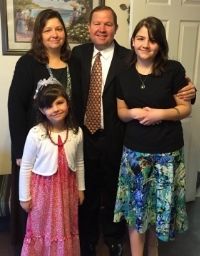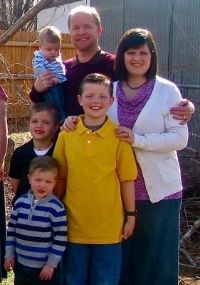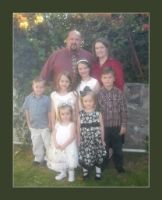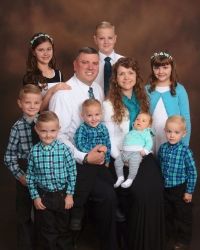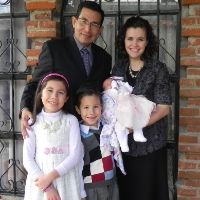“And Abram said unto Lot, Let there be no strife, I pray thee, between me and thee, and between my herdmen and thy herdmen; for we be brethren.”
Genesis 13:8
I have four daughters, and four sons. To each of you I say, “I don’t want there to be anything between you and me.” I have four sons in law, and four daughters in law. “I hope there will never be anything between you and me.” I have three brothers. To them and my sisters in law I say the same “Don’t let anything come between you and me.” If you know me, I want there to be nothing between you and me. I want our relationship to be everything it should be, whether as your mother, your sister, or your friend.Genesis 13:8
There’s a story in the book of Genesis about a man and his nephew. Abraham was a wealthy man. God had blessed him with cattle and land. He lived in the land of Canaan with his wife, Sarah, and his nephew, Lot. They migrated there from Ur, a land of pagan idolatry. It was in this place that God chose to bring Abraham to start a new generation that would love and serve Him. Abraham didn’t use the excuse that he came from a pagan background. He trusted God to fulfill His promise through him and Sarah, although they were both nearing 100 years of age.
Everything belonged to Abraham. Lot was a tag-along. In fact God’s original plan was for Abraham to leave all. In part he obeyed, but not completely, because he brought Lot and his father, Terah with him. The Bible says that Terah was an idolater.
One day Abraham noticed that his servants and those of Lot were fighting over the greenest pasture for their sheep. Abraham valued the relationship with his nephew more than his animals. He knew that if their shepherds were disagreeing, in a short time, so would they. So although everything belonged to Abraham, he came up with a solution: “Lot, you choose the pasture land you would like to have. If you go to the left, I’ll go to the right. If you choose the right, I’ll go to the left.” And Lot chose the richest pasture land. It reminded him of the rich land of Egypt, which by the way he remembered, because Abraham had taken his family there during the time of famine, instead of trusting the Lord to provide his needs.
Abraham was willing to give up the best pasture land in order to keep anything from coming between him and his nephew.
God saw Abraham’s heart, and He called Abraham apart to live in the land of Hebron. Hebron means “the place of communion.” The verb commune means to communicate intimately. Abraham and God were friends, intimate friends.
Abraham was far from perfect. But God chose him to be the father of a nation.
Maybe because I’m a widow, and I don’t have the companionship of a husband, but I long to have an intimate relationship with God. I’m not where I wish I were in our relationship, but I know what I long for.
But just as there are things that come between a husband and a wife to harm their relationship, there are things that can wedge themselves between the Lord and a Christian. I know. I’ve experienced it. Just as I’ve enjoyed close communion with the Lord, I also know what it is to feel something is not right.
The ultimate goal of a Christian should be to please the Lord, and bring honor to Him in all we do. Unless we take stock of our lives, and acknowledge what it is that is hindering our relationship, whether between husband and wife, mother and child, or a Christian and the Lord, we’ll never make that relationship more intimate.
So I’ve tried to analyze my personal relationship with the Lord, and I came up with a list of possible problems that could come between the two of us. At the top of my list is “Anxiety.” I’m going to share with you what I’m feeling this morning.
The dictionary defines anxiety as “uneasiness usually over an expected misfortune.” If I’m going to be a blessing to you, I must expose my feelings, and I’ll have to admit, I very often have feelings of anxiety. I started this lesson exactly one week away from a very exciting trip. The most unsettling thing I do is to leave the comfort and security of my beloved home. But this was going to be a happy trip, because I was meeting my son, David, and his wife, Jolene and their three children, whom I had not seen in almost two years. I was also going to be attending a Christian Womanhood Spectacular, which I’ve attended only in my dreams since I was a young wife and mother. The joy and thrill of that precious reunion, and my dream of a lifetime come true, was being over-shadowed by anxiety: what if my plane from Chiapas takes off late, and I don’t have enough time to change planes in Mexico City? What if the hotel I reserved for that night cancels my reservation, because I have a late check-in, and I have to sleep in the lobby, or in the airport? Is it cold in Chicago in October? Should I take a coat? Will my luggage be over-weight? And on and on went the “uneasiness” of this “expected misfortune.” Not only do those feelings bring a distance between the Lord and me, it robs me of the joy I should be feeling, it makes me unproductive, it robs me of much-needed sleep, it makes me irritable with others, it makes me say things that I wouldn’t say, or even think if I would simply do what the Bible tells me to do in Philippians 4:6, “Be careful for nothing; but in every thing by prayer and supplication with thanksgiving let your requests be made known unto God. And the peace of God, which passeth all understanding, shall keep your hearts and minds through Christ Jesus.” The most valuable treasure anxiety takes from me is peace, the peace of God, according to this Scripture. I need to do what Peter tells me to do, “Casting all your care upon him; for he careth for you.” I Peter 5:7 Peter was a fisherman, and I believe we can imagine our casting our cares on Jesus, just as Peter cast his net into the sea. I don’t envision God sitting up in Heaven, shaking His head in disgust at me for not trusting Him, because of the last part of that verse, “He careth for you.” Our anxieties are important to Him, because they’re part of what keeps us from being close.
So I took practical measures to at least limit my anxieties. I made a list of things I needed to get done before my departure date. I even put little abbreviations of the day I should have each one finished by the side of each item. I at least knew what needed to be done.
There are anxieties I have which are real. I have actually slept in a hotel lobby, but I have precious memories of that short night, and the lessons the Lord taught me. I have also had luggage that exceeded the weight limit several times. But I’ve also seen the Lord deliver me from having to leave anything behind, or even having to pay extra.
Many things that cause our anxiety, whether real or imagined, can be useful: they can motivate us to get organized, take stock of the way we spend our time, or just simply be thankful for someone, perhaps, we’re afraid we’re going to lose. Just as I may know the consequences of my plane taking off late, I must realize there are certain things over which I have absolutely no control. I can’t control the weather in Chicago, any more than I can control flight schedules. I must do as Peter tells me. I must cast my care on Him, Who cares for me, and realize that some things are totally out of my control. I must do the best I can to be on time for all my flights, and I wisely went online, checking the weather forecast for Chicago. But the success of failure of my trip didn’t depend on everything going perfectly. It depended on my trust in the One Who cares for me, and Who is in the “control tower” of my life.
So that morning I went fishing. I did some casting. I did this by just talking to the Lord, and admitting my anxieties to Him. I prayed for my pilots, and I asked Him to put kind people in my path. I asked Him to give me His peace for my anxieties.
And that’s exactly what He did.
Billie Sloan
Nahum 1:7



